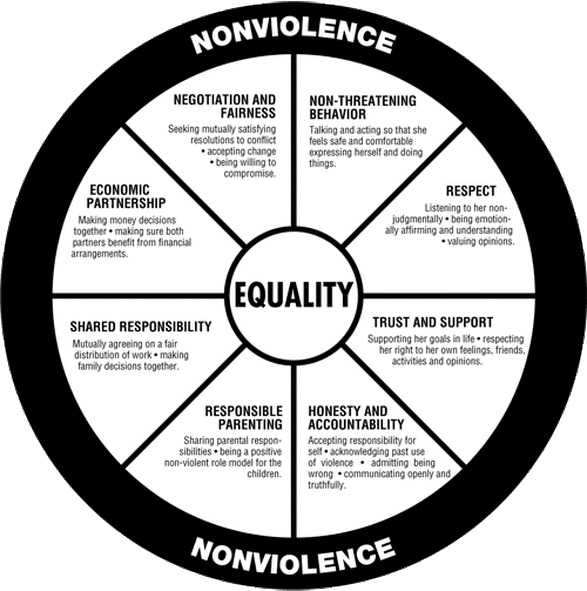THERE'S MORE THAN ONE TYPE OF ABUSE
ECONOMIC ABUSE: |
Economic or financial abuse is when an abusive partner extends their power and control into the area of finances. This abuse can take different forms, including an abusive partner:
|
EMOTIONAL ABUSE: |
You may be in an emotionally abusive relationship if you partner exerts control through:
|
PHYSICAL ABUSE: |
You may be experiencing physical abuse if your partner has used or repeatedly used any of the following tactics of abuse:
|
WHAT IS A HEALTHY RELATIONSHIP?
THE FACTS:
- A woman is beaten every 15 seconds. (Bureau of Justice Statistics, Report to the Nation on Crime and Justice.)
- Ninety-five percent of the victims of domestic violence are women. (Violence Against Women, June 1992, The National Women's Health Resource Center.)
- Domestic Violence is the leading cause of injury to women between the ages of 15 and 44 in the United States -- more than car accidents, muggings, and rapes combined. (Uniform Crime Reports, Federal Bureau of Investigation, 1991.)
- As many as one-quarter to two -thirds of battered women report abuse during pregnancy. (Violence Against Women, June 1992, The National Women's Health Resource Center.) Battered women are more likely to suffer miscarriages and to give birth to babies with low birth weights. (Surgeon General, United States, 1992.
- Sixty-three percent of the young men between the ages of 11 and 20 who are serving time for homicide have killed their mother's abuser. (March of Dimes, 1992.)
- Women of all cultures, races, occupations, income levels, and ages are battered -- by husbands, boyfriends, lovers, and partners. (Surgeon General Antonia Novello, as quoted in Domestic Violence: Battered Women, a publication of the Reference Dept. of the Cambridge Public Library, Cambridge, MA.)
- One in five women victimized by their spouses or ex-spouses report they had been victimized over and over again by the same person. (The Basics of Batterer Treatment, Common Purpose, Inc., Jamaica Plain, MA.)
- Battering is the establishment of control and fear in a relationship through violence and other forms of abuse. The batterer uses acts of violence and a series of behaviors, including intimidation, threats, psychological abuse, isolation, etc. to coerce and control the other person. The violence may not happen often, but it remains as a hidden (and constant) terrorizing factor. (Uniform Crime Reports, Federal Bureau of Investigation, 1990.
National Domestic Violence Fact Sheet
Wisconsin Domestic Violence Fact Sheet
Sexual Assault Fact Sheet
For local referrals and confidential counseling, please call New Day Advocacy Center at 715-682-9565 or toll free 1-800-924-4132, or call the National Domestic Violence Hotline at 1-800-799-SAFE (7233).


